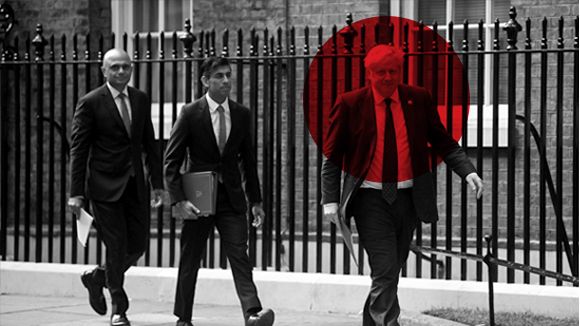I’m never knowingly outdone in disdain for Boris Johnson and the havoc he has wrought. But commentary on the parlous state of British democracy is maybe too personalised as regards the great charlatan. In truth, he is as much the product as the cause of the deep underlying malaise in British politics, for which much of the blame falls on the lurch towards activist control of the choice of party leaders and prime ministers. This corruption of parliamentary democracy is playing out yet again in the Dutch auction on tax which is dominating the current Tory leadership contest.
I have written previously about Johnson “the prime Etonian,” the peacock of a cynical, almost amoral elite populism which has grown out of England’s resurgent public schools and their wealthy patrons over the last generation. But equally damaging has been a warped form of democracy which, in both major parties, has seen the power of choosing leaders pass to self-selected activists.
Put that together with a second key trend in Britain’s unwritten, make-it-up-as-you-go-along constitution—the fact of mid-term leadership coups without reference to the public at large—and it explains how we got Johnson and a devastatingly hardline Brexit policy three years ago. We could get something almost as bad again after the mid-term coup that is currently underway.
A majority of prime ministers in the past half century have come to office through mid-term party coups or resignations, with no reference to the public whatever. When Johnson’s successor steps through the doors of No 10, the proportion will be even greater.
The record of these mid-term leaders—Callaghan, Major, Brown, May, Johnson—is mostly one of weak and short-lived governments which failed to survive, or only barely survived, their first encounter with the electorate. A big part of the reason for their weakness is that they never started with a democratic mandate. Worse still, over the past generation the two major parties have passed the choice of their leader to party activists, taking it away from MPs who—whatever their other failings—are by definition elected and highly conscious of their own political mortality.
Johnson represented the perfect storm: a cynical elite populist manipulating Brexit to create the coup in 2019 which destroyed his weak predecessor Theresa May, herself a mid-term leader who had shifted to a hard Brexit position in order to secure the succession to Cameron just three years previously. Johnson went on to win a general election because the choice was either him or Jeremy Corbyn, Labour’s equivalently preposterous populist, chosen by Labour members with anyone but centre-ground voters in mind.
And that was the last of Corbyn’s services to Tory populism. But for him, the Brexit campaign would probably not have won Cameron’s 2016 referendum; nor would May have survived the 2017 general election, where she lost her majority, albeit kept the Tories as the largest party in a hung parliament.
This toxic compound of party populism and mid-term coups is a peculiarly British phenomenon, made worse by the fact that the Tories will ultimately almost always pull off a victory against a divided opposition in our winner-takes-all electoral system. It sets Britain apart from our largest democratic neighbours, France and Germany, which have managed to sustain more durable and stable governments—generally more economically successful thereby—built around a viable centreground.
Since General de Gaulle’s departure in 1969—by then in his 11th year of office, unpopular for being too stern, not too tainted by scandal—no French president has resigned or been forced out mid-term. In the same period, only two German chancellors have resigned mid-term: Willy Brandt, over a spy scandal of which he was personally innocent, and his successor Helmut Schmidt, who lost his parliamentary majority after eight years in power. Neither of them were weak, let alone cavalier, corrupt or populist.
In France it is not even possible for there to be a mid-term change in the head of government without a new public election. In Germany it requires an elaborate parliamentary process, including a secret ballot of all MPs, to replace one chancellor with another. It last happened when Schmidt was succeeded by Helmut Kohl 40 years ago, and that was swiftly followed by a general election. No head of government in either France or Germany has served for less than four years in the last half century, whereas most—yes, most—British prime ministers in that time have lasted less than four years if you count Wilson’s second term. Three of the last four have been promptly booted out. Thatcher and Blair look ever more exceptional as prime ministers with strong popular mandates, leading viable and durable projects of political reform.
Which brings us to the latest election of a Tory leader and prime minister, who will be the third in six years. It is pretty clear that Rishi Sunak would get the job by miles if the choice lay solely with Tory MPs, even in a parliamentary party purged of those refusing to support Johnson’s hard Brexit in the last parliament. One can debate the extent to which Sunak has himself bent with the populist wind. But his position on tax and spend is conventionally sensible in a government lacking that quality in many other respects.
Sunak is pleading with his party not to lurch towards big unfunded tax cuts, and not to play fast and loose with inflation, the sustainability of the welfare system and public services. This position is under assault from virtually every candidate to his right, almost all of them running on the latest brand of Johnsonian “cakeism,” promising both big tax cuts and higher spending or, if they accept the need for spending restraint, offering no further detail on what that looks like.
So in an environment where toxic populism reigns, the latest mid-term coup could end up as a case of “the king is dead, long live the king” (or queen, given the candidates). Hardly an auspicious departure from the worst government of modern times.













